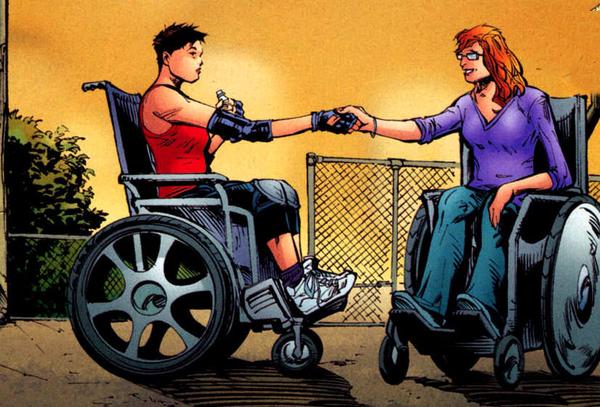If you’ve read any of my work previously, you know that I’m a disabled person.
I’m also a major geek. While I’ve had a fondness for superheroes and comics in the visual media, it was not until I got into adulthood that I started to appreciate comic books, and the diversity that the comic book industry has taken on, in recent years. While many believe Marvel is leading the way, and DC is resistant to change, it’s hard to ignore comic book writers like Gail Simone (a DC writer), who has offered us more women, more LGBTQIA people, and even some diversity of abilities (Vengeance Moth is my new favorite character in comics – long live The Movement).
However, we really can’t ignore the fact that there is a lack of diversity in most forms of media. The comic industry is really leading the way, in a lot of ways. The area where I feel they are failing most though, is diversity of disability. Sure, you’ve got your Charles Xavier, your Oracle/Barbara Gordon, (who temporarily used a wheelchair due to paralysis), and your Daredevils, but the amount of disabled characters is few and far between. Even discussions on comics about diversity and comic book diversity resolutions lack mention of disability. Much like in current U.S. society, the large disability population remains virtually voiceless, in the comic book medium.
In the United States, a large part of this is due to the fact that we see disability in a certain way. When we think about disability, we often see it as something that is negative. Rather than focusing on the positive or neutral aspects of disability, those of us who are disabled are considered disadvantaged.
By the very nature of comics, a comic book hero is seen as someone who has a unique advantage over the average human. So, if disabled people are already flawed, and essentially many consider us less capable or less than the average human, why would we even be considered for a role that has more advantage? It isn’t right, but it is common logic. Our society has long been image-based, and the image of disability is still often depicted as a negative image.
What comic creators have done, when it comes to disability, is create characters that are powerful, but still have disabilities. Professor X cannot stand or walk, and it doesn’t matter. He doesn’t have to, to use his extensive mental powers (Note: I absolutely loved the idea in Days of Future Past that a “cure” for his paralysis, was a huge deficit, as it meant he couldn’t use his amazing mental gifts). Daredevil’s blindness actually heightens his other senses, and works as a great advantage to him. Vengeance Moth doesn’t have to worry about walking, because when she evokes a moth, she can fly! These people still are disabled, but it doesn’t matter, because they are able to do amazing things, in spite of their disability!
When it comes to diversity initiatives, the disability community is often left out. I don’t know if it is because people don’t think we matter, but this is very common. I’m not blaming those who are interested in comics or even the comic book industry. They may not be aware enough of disability culture to even consider including characters with disabilities. Of course, I think that we should tell them. We should encourage much more diversity. I have quite a few ideas that could diversify the ability levels of those in the comic book genre, so if I have ideas, I’m sure the experts, who have been writing comics for years, should not have a problem coming up with something equally as fantastic.
Truly, like in other art forms, I’d really like for the disability community to be invited to the table. What comics have done for the LGBT community is quite inspiring. The inclusion of LGBT people in major roles, in comics, has provided a new level of acceptance and understanding. We desperately need that in the disability community. If only, we could make people see, through comics, that disabled folks are just like everyone else and just as capable as everyone else, I believe society would be willing to accept and treat disabled people a lot better.
What do you think? Are comics doing it right or do we need to see more diversity, including disability, in the industry? Leave a comment below, with your thoughts!


I really feel you Dominick, using comic characters with disabilities should just be as normal as you create any other characters. It shouldn’t portray any kind of weakness at all. most of those that I have seen have that power and it brings in equality. Disability isn’t inability.
Cindy